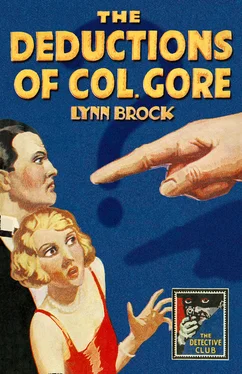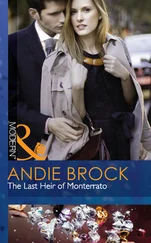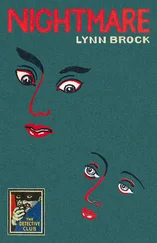‘Angela, have you forgotten Colonel Gore? He has been regarding you with the most reproachful of eyes.’
Angela Heathman smiled nervously and held out a languid hand. At close quarters the sallow, haggard weariness of her face, with its drawn lips and shadowed eyes, was still more noticeable. Beside her sister’s florid exuberance her faded thinness was accentuated painfully. Her smile faded, her eyes looked beyond him in brooding abstraction. She said nothing—withdrew her hand listlessly, and appeared to have forgotten the existence of the people who surrounded her.
‘Nerves, poor thing,’ Gore reflected. ‘Another of ’em that doesn’t know why she was born.’
As a silvery-toned clock somewhere in the room chimed eight fleetly, Clegg announced the last guest.
‘Mr Barrington.’
For a moment the hum of voices died. The man who had entered surveyed the occupants of the room with smiling composure as he moved towards his hostess.
‘My wife has charged me with the most abject of apologies, Mrs Melhuish. She had hoped until the last moment to be able to come.’
‘We are so sorry,’ Mrs Melhuish assured him. ‘But it would have been folly for her to have ventured out on an evening like this. Of all afflictions in the world, I can imagine none worse than earache.’
‘Dreadful. Quite dreadful,’ Barrington agreed. He included Melhuish in his smile. ‘However, she has retired to bed with a large supply of aspirin tabloids at hand … How are you, doctor? Worked to death, I suppose, as usual? I see you rushing about in that big car of yours from morning to night. Lot of sickness about, isn’t there?’
‘Yes,’ said Melhuish simply.
Not a brilliant conversationalist, Dr Sidney Melhuish, Gore reflected—an exceedingly dry stick indeed. No one could suspect him of shyness or nervousness; his clean-cut face was as cool as a chunk of ice. Just one of those men who just didn’t want to talk most of the time and wouldn’t. Grim-looking chap, when his mouth set. Sort of chap that would look at your tongue and tell you you had six months to live and touch the bell for his man to show you out. Poor Pickles … What sparkling conjugal tête-à-têtes …
And yet, a moment later, when Melhuish crossed the room, Gore caught a glimpse of another man—a man whose kind, wise eyes and almost boyish sincerity and simplicity of manner and gesture brought a faint flush of animation to Angela Heathman’s apathetic face as he smiled at her. No doubt she, too, was a patient of his. For that matter, as far as Gore had been able to discover, everybody in Linwood was, though it was only four years or so, he had learned, since Melhuish had purchased an old and decaying practice and installed himself in that most conservative of Westmouth’s suburbs, a stranger and an interloper. True, he had brought with him from Bath, where he had been in practice for several years before the war, a reputation for brilliance, especially in heart cases. But Gore knew the stiff reserve and suspicion of Linwood too well to believe that a reputation for anything in the world acquired, anywhere else in the world could influence it in the least. Something—something which no doubt Pickles had found out for herself—there must be in this difficult husband of hers that was not vouchsafed to the common or garden general practitioner … Something, for instance, that had been able to win for him not merely the patronage but the friendship of a man like James Wellmore, whose sole standard of judgment was value for his money.
His eyes returned to the shrivelled, peevish face of the tobacco magnate, bent obstinately on the fire, its underlip protruding sulkily as he listened to something which Barrington was saying to him. There was no trace of affection, paternal or otherwise, in his expression just then. Indeed as Barrington moved away from him towards Mrs Melhuish, Wellmore turned to look after him with an unmistakable scowl until, detecting Gore’s interest in him, he switched his erring gaze back to the fire once more.
‘I have succeeded in finding that cutting for you, Mr Barrington,’ said Mrs Melhuish.
‘How kind of you to have remembered,’ replied Barrington, displaying his small, even teeth in a smile of open admiration. He was an extraordinarily handsome man, Gore admitted ungrudgingly—quite the handsomest man he had seen for some time—with some quality of charm that lay deeper than the perhaps slightly theatrical effect of his dark aquilinity and reckless gray eyes. Thirty-five at most, broad-shouldered, slim-flanked, easily—a little too easily, perhaps—sure of himself, he was one of those men at whom no woman could look without interest or without the awakening of her oldest and strongest instinct. Already Gore had noticed with amusement that, as he moved across the room to his hostess, the regards of the other three women had followed him with a speculative intentness. And that the charms of this smiling Adonis were not lost upon Mrs Melhuish herself was no less evident. Her colour had brightened beneath the flattery of his look; her poise and intonation as she spoke to him were tinged with the subtle challenge of her sex—the indefinable yet unmistakable blending of defiance and invitation that—by a cynic as hardened as Wick Gore—could be taken for nothing but … well, what any chap with two eyes in his head would take it for. Miss Pickles hadn’t changed all her spots, then—for all the rash vows of holy matrimony. Still a flash of colour and a sparkling eye for an agreeable-looking young fellah. She had always preferred ’em dark … and a bit hooky about the beak.
‘I put it down somewhere,’ said Mrs Melhuish, glancing about her. ‘Now … where …? Oh, yes. I remember.’
She moved to the piano, and picked up an envelope that lay on some music. Barrington took the envelope from her smilingly, opened it, glanced casually at the newspaper cutting which it contained.
‘Thanks so much,’ he said, as he replaced the cutting and put the envelope away in a pocket. ‘As a matter of fact I had rather thought of running up to look at another shoot in that part of Wiltshire this week.’
‘Really?’
Mrs Melhuish’s colour had forsaken her now. Her eyes consulted with anxiety the little Sèvres clock on the table beside Gore, rose to his brown, hard profile, and rested there for a moment warily. He stood but an arm’s-length from her; but he was listening with the most flattering of attention to Lady Wellmore’s views upon the sinister aims of Labour. The slightest movement of her golden head showed her her husband and Sylvia Arndale grouped by the big chair near the fire into which Wellmore had subsided with a yawn. At the other side of the room Arndale struggled feebly with Miss Heathman’s vague-eyed listlessness, pausing between each laborious effort to regard a water-colour above her head vacantly. Mrs Melhuish’s hand strayed to a bowl of chrysanthemums by the piano, touched a great gold and russet bloom caressingly.
‘If the door is shut, go away,’ she said softly—almost inaudibly. ‘I may not be able to manage tonight. I will ring you up tomorrow at eleven if not.’
Barrington bent to examine the gorgeous blossom.
‘It will be open,’ he smiled.
His reckless eyes dwelt in hers victoriously for an instant. As she turned to introduce him to Gore, Clegg appeared once more, slightly flushed and seven minutes late.
‘Dinner is served, madam.’
CHAPTER II Contents Cover Title Page Copyright Introduction Chapter I Chapter II Chapter III Chapter IV Chapter V Chapter VI Chapter VII Chapter VIII Chapter IX Chapter X Chapter XI Chapter XII Chapter XIII Chapter XIV Chapter XV Chapter XVI Chapter XVII Chapter XVIII Chapter XIX Chapter XX Chapter XXI Chapter XXII Chapter XXIII Chapter XXIV Chapter XXV Chapter XXVI Chapter XXVII Chapter XXVIII Too Much Imagination Chapter I. Into the Net Chapter II. Too Much to Swallow Chapter III. The Note in her Hand Chapter IV. Gore is Frank Chapter V. Bloodstained Linen Chapter VI. Arling Makes a Confession Chapter VII. Tastes of a Secretary Chapter VIII. Spain Waxes Vehement Chapter IX. What Really Happened Also by Lynn Brock The Detective Story Club About the Publisher
Читать дальше












